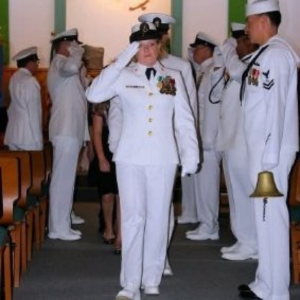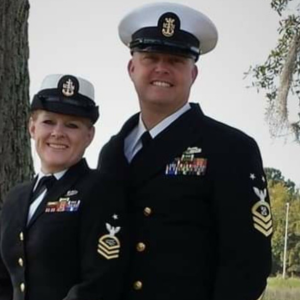 After years of structure, purpose, and camaraderie in the military, stepping into a civilian world that operates differently can feel overwhelming.
After years of structure, purpose, and camaraderie in the military, stepping into a civilian world that operates differently can feel overwhelming.
The hardest part for me wasn’t just finding a job or adjusting to a new schedule – it was coming to terms with the changes in my identity and processing years of experiences I hadn’t fully unpacked.
I went to boot camp at 17 and quickly learned the value of discipline, teamwork, and resilience. The Navy took me all over the world. I served on ships and bases, worked alongside people from all walks of life, and faced challenges that pushed me to my limits. Whether navigating tough deployments, leading a team, or solving problems under pressure, the Navy became my second family and my foundation. Over the years, I grew from a wide-eyed teenager into a seasoned professional, taking on roles and responsibilities I never could have imagined when I signed up.
But after more than 20 years of service, it was time for a new chapter. Transitioning from the military in 2009 was one of the most significant changes I’ve ever faced. The decision wasn’t easy – how do you step away from something that has shaped every part of your identity? I asked myself questions I’d never considered before: What’s next? Who am I outside of the uniform? I wasn’t prepared for the challenges to my mental and emotional health, among the most significant hurdles for many veterans, including myself.
Thankfully, there are organizations dedicated to supporting veterans in this critical area. One that stands out is Check-In, powered by the Veteran Wellness Alliance. It focuses on mental and brain health and offers resources, tools, and a sense of community for those navigating the complexities of life after service. What makes Check-In unique is its commitment to breaking the stigma around mental health – an issue that often prevents veterans from seeking the help they need.
Being a veteran helping other veterans through Check-In has been one of the most rewarding experiences of my journey. It allows me to take what I’ve learned – both the challenges and triumphs of my transition – to support others navigating the same path.
There’s a special connection that forms when veterans help each other. We share a common bond, a mutual understanding of what it means to serve, and the hurdles that come with stepping into civilian life.
It is powerful when a veteran I’m speaking with learns that I have walked in their shoes. It’s as if a wall comes down. The conversation shifts from guarded and formal to relaxed and trusting. They know I’m not just someone reciting advice from a script. I truly understand and know their struggles, frustrations, and concerns because I, too, have lived them.
Like many veterans, I found the transition to civilian life both exciting and daunting. The structured world of the military, where everything had a clear purpose, suddenly gave way to a civilian environment in which the rules weren’t always so obvious. There was no checklist for navigating a job search or choosing a career path, and I sometimes felt like I was starting from scratch.
As service members, we’re trained to push through adversity, to focus on the mission, no matter the personal cost. While that mindset serves well in uniform, it can make it difficult to seek help once we transition. And mental health is an often-overlooked part of our transition process.
I discovered the importance of seeking support – both from fellow veterans and from organizations dedicated to helping service members transition successfully. I also leaned heavily on the lessons I learned in the Navy: persistence, adaptability, and commitment to the mission, no matter how uncertain things seemed.
At Check-In, we talk about the uncertainty of finding a new purpose after leaving the military, the difficulty of navigating a less structured world, and the toll these changes can take on mental health. Sometimes, all it takes is a simple acknowledgment: “I’ve been there too. I get it.” That shared understanding opens the door for a deeper, more meaningful dialogue.
 I’ve seen firsthand the impact that empathy and shared experience can have. It’s not just about providing resources or guidance; it’s about creating a safe space where veterans feel heard, valued, and understood. Knowing that my story and my willingness to listen can make a difference is what keeps me motivated every day.
I’ve seen firsthand the impact that empathy and shared experience can have. It’s not just about providing resources or guidance; it’s about creating a safe space where veterans feel heard, valued, and understood. Knowing that my story and my willingness to listen can make a difference is what keeps me motivated every day.
If there’s one message I’d share with my fellow veterans, it’s this: seeking help is a sign of strength. The same courage it takes to face challenges in uniform is the courage it takes to invest in yourself and your well-being. Organizations like Check-In are here to help, and they can make all the difference as you navigate this new chapter.
Helping other veterans also reminds me that our service doesn’t end when we hang up the uniform. By supporting one another, we continue to serve a mission greater than ourselves – ensuring that no one faces transition or mental health struggles alone.
Susan Roth is a retired U.S. Navy Information Systems Technician Senior Chief Petty Officer ITCS(SW) and Care Coordinator at Check-In.

























